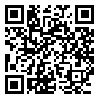Volume 9, Issue 3 (Spring 2024)
Health in Emergencies and Disasters Quarterly 2024, 9(3): 173-182 |
Back to browse issues page
Download citation:
BibTeX | RIS | EndNote | Medlars | ProCite | Reference Manager | RefWorks
Send citation to:



BibTeX | RIS | EndNote | Medlars | ProCite | Reference Manager | RefWorks
Send citation to:
Najafi M, Fathi S. Examining the Relationship Between Burnout and Personality Traits in Accidents and Disasters’ Rescuers. Health in Emergencies and Disasters Quarterly 2024; 9 (3) :173-182
URL: http://hdq.uswr.ac.ir/article-1-535-en.html
URL: http://hdq.uswr.ac.ir/article-1-535-en.html
1- Department of Rescue and Relief, Iran-Helal Higher Education Institute, Tehran, Iran. , najafirc@gmail.com
2- Red Crescent Society of Tehran Province, Tehran, Iran., خیابان ویلا- جمعیت هلال احمر استان تهران ،
2- Red Crescent Society of Tehran Province, Tehran, Iran., خیابان ویلا- جمعیت هلال احمر استان تهران ،
Abstract: (3048 Views)
Background: Various studies indicate the risk of accidents and disaster rescuers suffering from burnout syndrome. Job burnout consists of three components, namely emotional exhaustion, depersonalization, and reduced personal accomplishment. Personality traits as crucial variables are involved in the occurrence of job burnout. No study was conducted in Iran on the relationship between job burnout and the personality traits of rescuers in accidents and disasters; therefore, this study investigates reducing burnout in rescuers by selecting them appropriately.
Materials and Methods: This was a cross-sectional correlational study conducted to investigate the relationship between burnout and the personality traits of rescuers. The studied population included all the rescuers of the 16 branches of the Red Crescent Society in Tehran Province, Iran, who worked in 19 rescue centers. The sample size was 414 men, of which, 254 people were randomly selected for this study. To evaluate the burnout of the participants in this study, the Maslach burnout inventory was used, and to measure the personality traits, the short form of the neuroticism, extraversion, openness, conscientiousness, and agreeableness questionnaire was employed.
Results: In this study, a positive significant relationship was observed between emotional exhaustion and depersonalization with neuroticism in rescuers, and a negative significant relationship was detected between emotional exhaustion and depersonalization with extroversion, agreeableness, and conscientiousness in rescuers. Additionally, a significant negative relationship was observed between personal accomplishment and neuroticism. Meanwhile, a significant positive relationship was observed between personal accomplishment with extroversion, agreeableness, and conscientiousness. No relationship was found between any of the three components of burnout and openness. This study showed that rescuers who score low in extroversion, agreeableness, and conscientiousness in their personality test and score high in neuroticism are more prone to burnout.
Conclusion: In addition to considering other necessary qualifications, rescuers should be selected based on low scores in neuroticism, and high scores in extroversion, agreeableness, and conscientiousness in personality tests. The result of such selection can be less burnout for rescuers along with providing better services to those injured in accidents and disasters.
Materials and Methods: This was a cross-sectional correlational study conducted to investigate the relationship between burnout and the personality traits of rescuers. The studied population included all the rescuers of the 16 branches of the Red Crescent Society in Tehran Province, Iran, who worked in 19 rescue centers. The sample size was 414 men, of which, 254 people were randomly selected for this study. To evaluate the burnout of the participants in this study, the Maslach burnout inventory was used, and to measure the personality traits, the short form of the neuroticism, extraversion, openness, conscientiousness, and agreeableness questionnaire was employed.
Results: In this study, a positive significant relationship was observed between emotional exhaustion and depersonalization with neuroticism in rescuers, and a negative significant relationship was detected between emotional exhaustion and depersonalization with extroversion, agreeableness, and conscientiousness in rescuers. Additionally, a significant negative relationship was observed between personal accomplishment and neuroticism. Meanwhile, a significant positive relationship was observed between personal accomplishment with extroversion, agreeableness, and conscientiousness. No relationship was found between any of the three components of burnout and openness. This study showed that rescuers who score low in extroversion, agreeableness, and conscientiousness in their personality test and score high in neuroticism are more prone to burnout.
Conclusion: In addition to considering other necessary qualifications, rescuers should be selected based on low scores in neuroticism, and high scores in extroversion, agreeableness, and conscientiousness in personality tests. The result of such selection can be less burnout for rescuers along with providing better services to those injured in accidents and disasters.
Type of article: Research |
Subject:
Relief teams
Received: 2023/09/22 | Accepted: 2023/11/17 | Published: 2024/04/1
Received: 2023/09/22 | Accepted: 2023/11/17 | Published: 2024/04/1
Send email to the article author
| Rights and permissions | |
 |
This work is licensed under a Creative Commons Attribution-NonCommercial 4.0 International License. |








